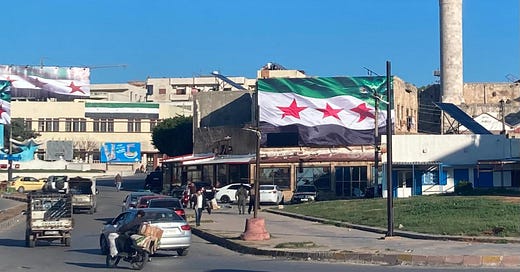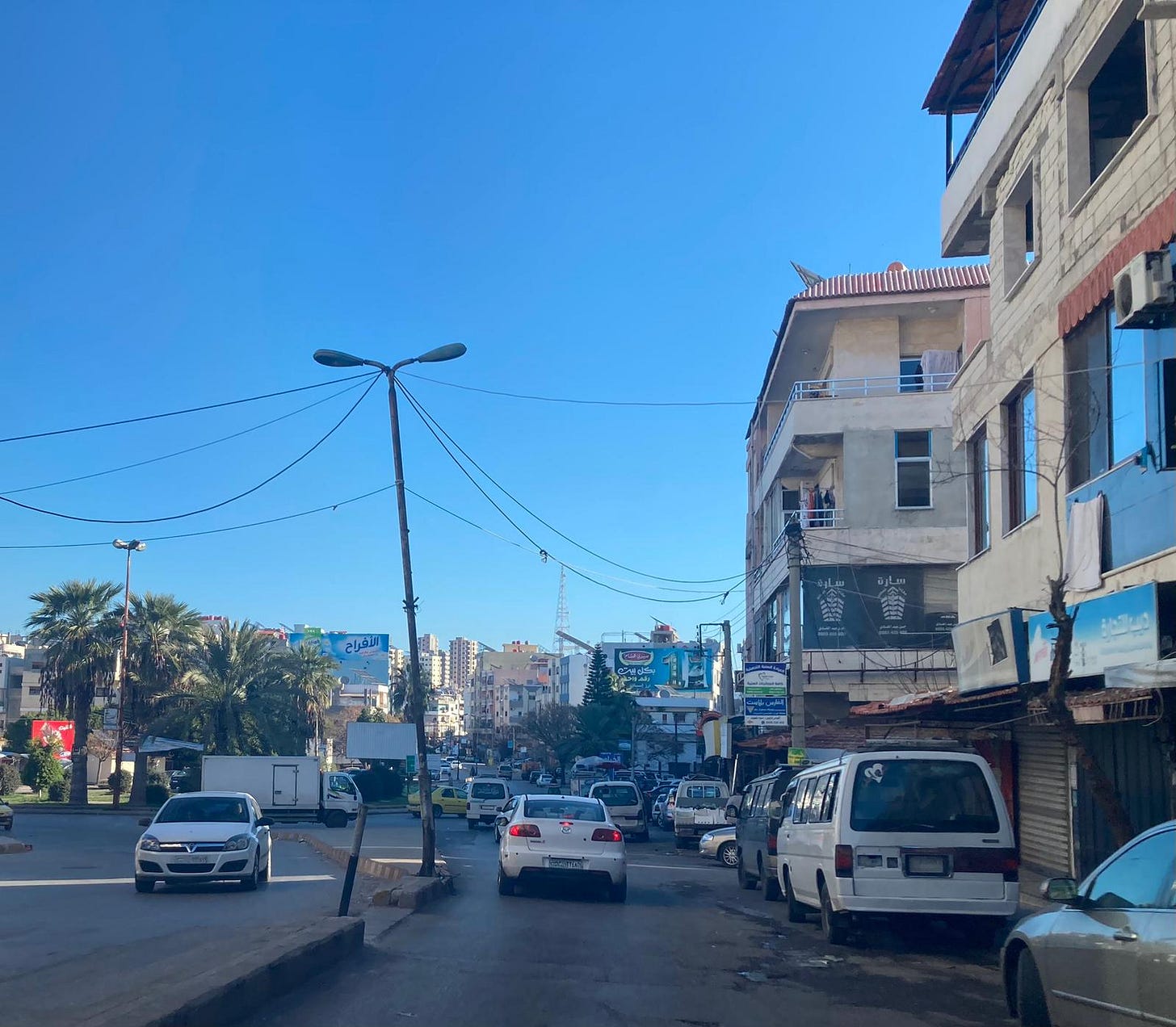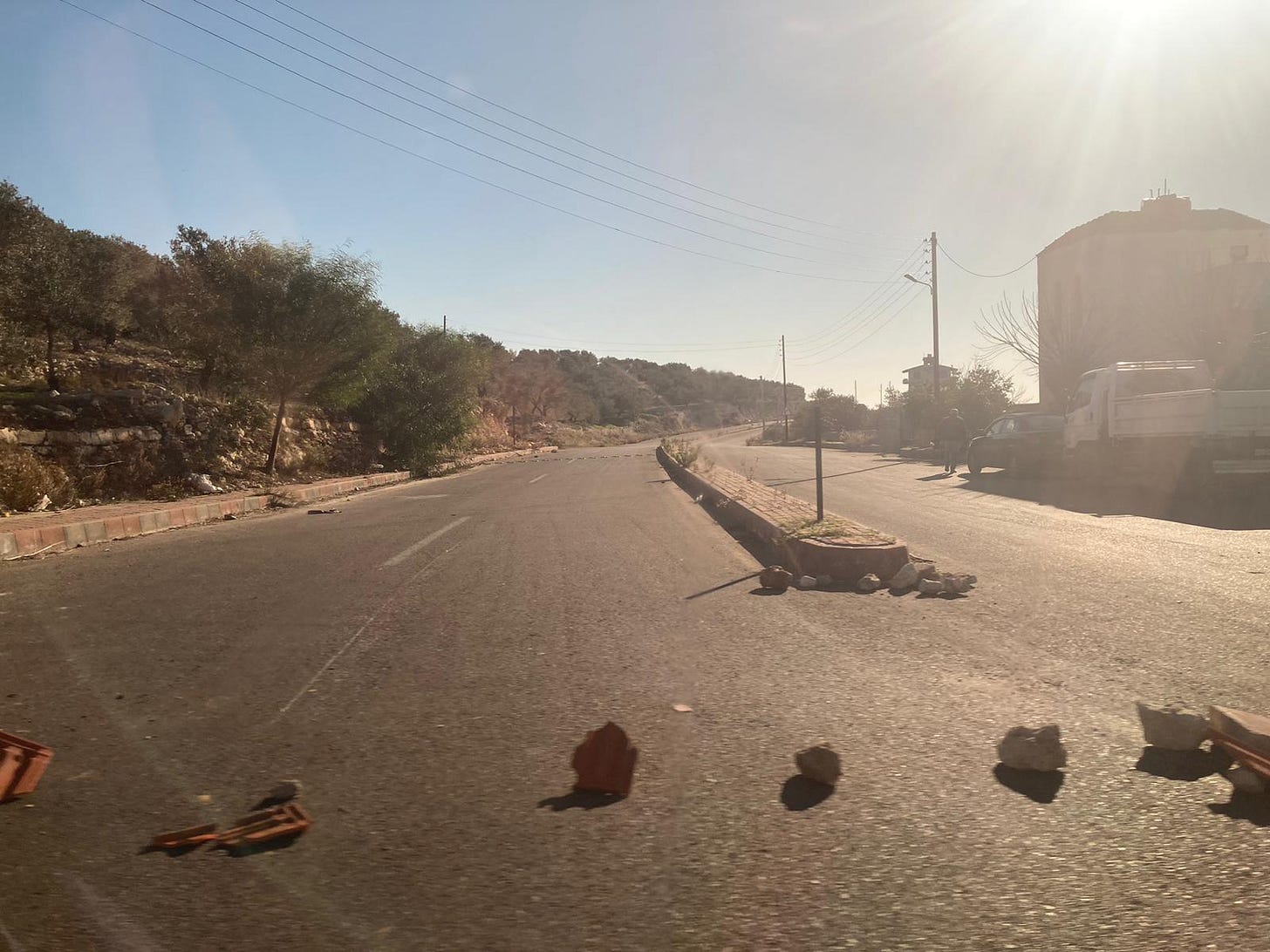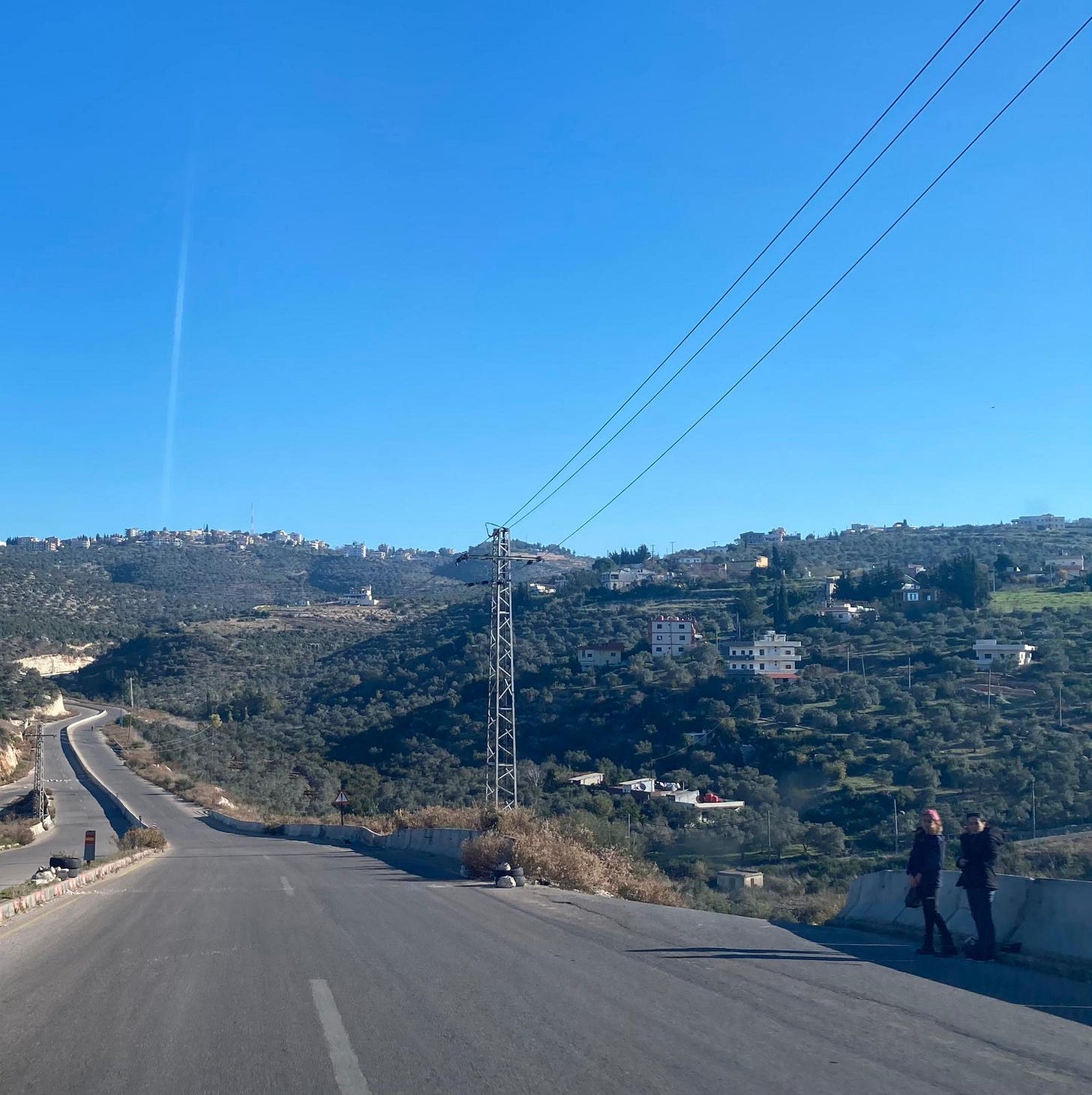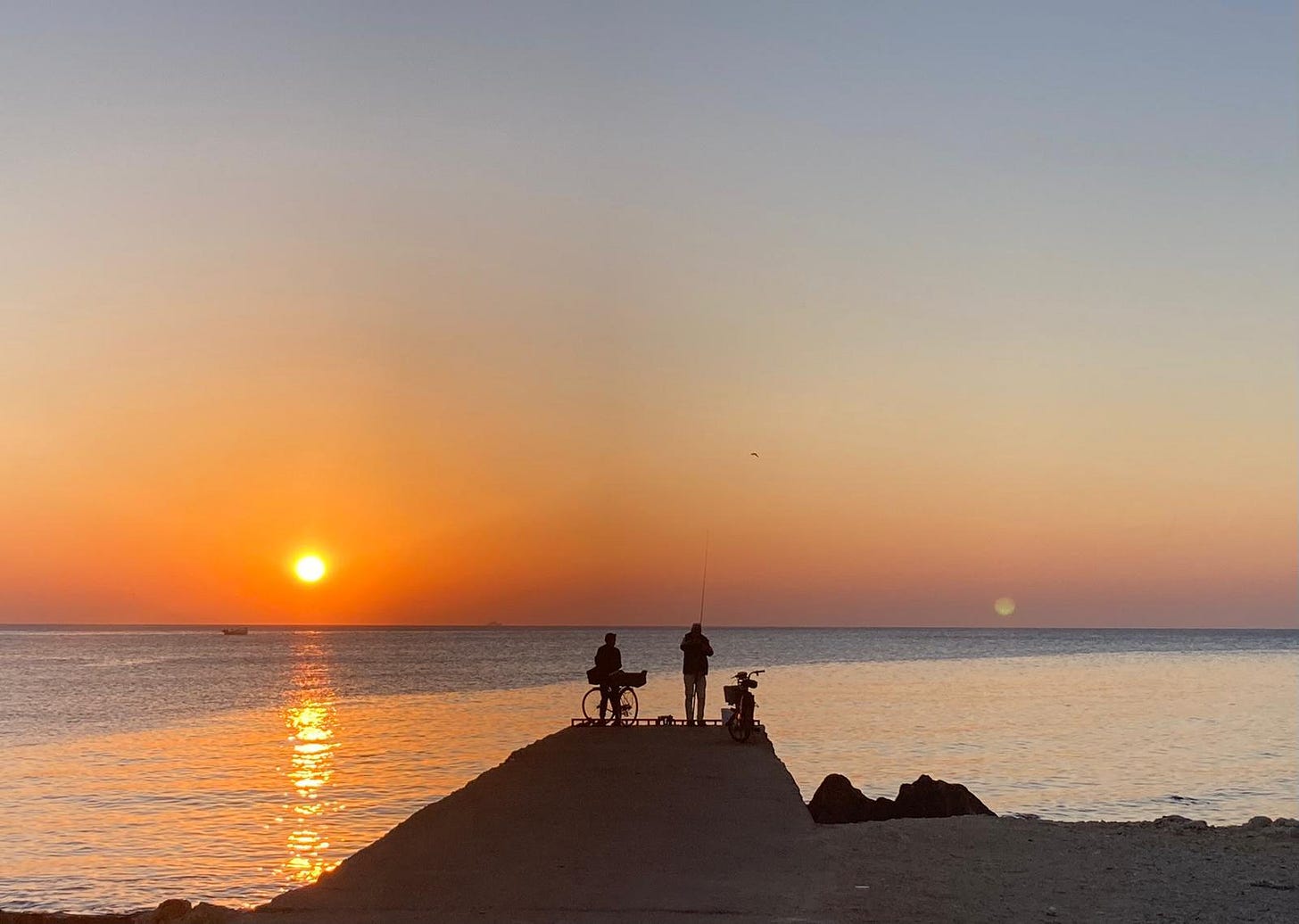“We need to know what comes next” – Voices from Tartous after Assad
Two weeks after Assad's downfall, the coastal community remains cautiously optimistic for the future
The city of Tartous is bustling with activity. Families stroll the corniche throughout the day and late into the night, hookah bars and cafes are packed, shops open and streets filled with cars. It is a return to a version of normalcy in the city never truly experienced before under the rule of Assad. Beneath the activities of every day life is a feeling of excitement, tampered by trepidation over Syria’s future.
“The first days it was chaos, but now it is better,” recalls Samir, a member of Tartous civil society, “There were robberies but HTS arrested those people and now the security situation is good.” Small groups of opposition fighters can be seen casually walking the major streets in Tartous, a small checkpoint set up at the parking lot for the pier, and otherwise concentrated around the new government facilitates. But they seemingly keep to themselves, and while guarding a Christmas fair one evening even had families approach to take pictures with them.
“When the regime fell I was scared, because we just heard that the army had vanished and militias were now coming to Tartous,” says Samir, “But then my friends from other parts of Syria called me, they told me what was happening, the protests in Damascus and what had happened in the other cities, and they reassured me of our safety.” Within hours the people of Tartous had taken to the streets to demonstrate against Assad and celebrate his downfall. “It was us who pulled down the statues and the signs, and it was us who put up the green flags everywhere,” he says proudly.
Life in Tartous had grown much worse in recent years, cratering what remaining support Assad had among the residents. One resident, Rawan, simply described those years by putting her hands around her neck and wincing, “choking.” As with most areas under regime control, the end of military operations in 2020 resulted in a significant uptick in criminality from security and state institutions. Some checkpoints were removed, and men were no longer harassed or risked detention if they didn’t carry their military service records with them - but the economic extortion skyrocketed. The infamous 4th Division, whose checkpoints in other parts of Syria were a main source of taxation against residents – instead focused on threatening and extorting businessmen in Tartous. The division, which spent the last years of Assad’s rule almost exclusively as financial mafia of sorts, used its power to create a monopoly on trade goods like metals and batteries.
For everyday people, it was the Customs Department that caused the most harm. In the past two or three years these officials began cracking down on “foreign imports” – which they now defined as any object made abroad no matter how many decades old it was. These ever-expanding arbitrary rules resulted in constant harassment and fines against businesses and consumers. Even the bus system participated: bus fares from Sheikh Sa’ad to Tartous were theoretically set at 1,000 Syrian pounds, but the drivers would consistently demand a new higher price before allowing passengers off, sometimes reaching as much as 7,000 SYP. The absurdity of the regime’s abuse found no end. Over the past year, desperate for a new source of money, the regime decided that all license plates needed to be updated – which conveniently required a 200,000 SYP fee.
Residents of the city were overjoyed to see the end of the parasitic regime. “When HTS arrived they were surprisingly friendly, and very helpful,” says Samir. “I think they were also surprised that everyone welcomed them,” agrees Rawan, “At first they thought it was fake, but now they see it is genuine joy for the fall of Assad.” HTS’s new efforts even extended to seemingly mundane issues like ending bus fare theft. “I remember one fighter stopped the bus I was in and warned the driver no to raise the fare,” says Samir, “Now the buses all have a set fare of 4,000 SYP and they actually run on a regular schedule, unlike under the regime.”
Yet as with every Syrian the author spoke with this week, the residents of Tartous are also scared for the future. “We have mixed feelings,” says Rawan, “Joy and happiness mostly, but also fear that things could change.” Samir emphasizes repeatedly the difference between rhetoric – which he believes HTS has done well with – and actions. “We need to give them time, but we are also watching them closely.” Tartous is a mixed city with Alawi, Christian, and Sunni residents that largely coexisted together well before the war. The residents here know little about HTS other than their perceptions of the more conservative and Islamist-style government in Idlib. Ensuring that their religious, social, and women’s rights are protected is a top priority.
The new government seems to understand this complicated dynamic. During this transition period before a new constitution and legal code is created, newly appointed governors and police chiefs are relying on the current Salvation Government code from Idlib. However, they have been told to adjust its laws and implementation to fit the local norms of each governorate, stripping away anything that would be unacceptable to the local population. The main task now is to rebuild the police force after all regime security infrastructure was disbanded. Members of Idlib Checkpoints Department have already been deployed to the outskirts of the city and a small number of pre-existing police officers from the Idlib branch work at the city’s headquarters. But most of the security is currently being provided by HTS and allied fighters. According to the new police chief, the plan is to gradually pull those fighters out of the city as they train up new police officers. He also emphasized that there will be no intelligence branches anymore, just one police force with its relevant departments
This manpower shortage means the new authorities cannot expand their work outside the major cities, leaving the rural villages without police or government administrators. Families and neighbors have instead banded together to protect each others homes, according to one family in a village outside Tartous. For example, the massive Israeli airstrike on December 15 on a weapons depot in the nearby hills caused a small earthquake which damaged some roads and houses. Several families in one village left for the city out of fear, so a few older men from their street have set up a roadblock at the village junction to prevent any outsiders from entering and looting the homes. But these regions have no experience in self-governance, unlike areas that were free from Assad earlier in the war and have a history of building local councils. There is no clear mechanism for dispute resolution and security let alone service provision and basic administration in these regions.
Rumors of sectarian-motivated attacks have also begun to spread in the countryside. “These are poor areas, since the French occupation the human resources here have been stripped away,” explains an elderly academic in a village outside Tartous, “the men can either go to the military or move to the cities for work, the communities remain uneducated and under-developed.” All Alawi residents interviewed cited the low education levels and poverty in the villages as a central factor for the easier adoption of pro-regime and anti-opposition narratives, especially those rooted in fear. “Of course there are rumors of sectarian crimes,” says one woman in a village, “but there are never details or names with these accusations, and I don’t think most people believe them.” The village residents interviewed insist that most people in the countryside accept the change but are afraid from the uncertainty of what’s next. “The Alawites chose to be a part of this country after the French were expelled,” says the writer, “we are part of the nation and must be treated equally.”
Still, not all rumors have been false. Several Alawite men have been murdered in Latakia, Hama, and Homs since December 8. Some were killed during armed robberies, but in Homs City there appeared to be a targeted killing of two former officers. Three bothers left for the local reconciliation (taswiya) center but were stopped by a car claiming to be from an opposition faction on the way. The fighters asked which of the brothers were officers and which were just enlisted soldiers, then asked the two officers to come with them. The next day the two men’s bodies were found in a nearby neighborhood. In Tartous, however, no one has heard of any such incident.
Nonetheless, rumors and news of real incidents are gradually spreading among parts of the Alawi countryside. Some insist that cities like Tartous are in complete lockdown, armed convoys roaming the streets while residents hide inside and shops remain closed. Just a few days walking the city and speaking with locals shows this is far from the truth, but the spread of such claims - and worse - among the countryside risks re-igniting rigidly sectarian threat perceptions among the very community that includes so many ideologically-committed ex-soldiers. Well publicized and visible HTS treatment of locals and arrest of criminals will go a long way to resolve this. “There are assurances by HTS,” says a woman from the countryside, “but only when they implement what they promise will we know it’s not fake, so we are waiting to see it happen.”
Cautious optimism and fear of reversals seems to be the dominating feeling in these areas. “The situation is what should be expected in any country going through a revolution,” says Rawan in reference to the murders and robberies. Samir and the people from the village all emphasize the need to be patient, but at the same time to diligently monitor what Jolani’s new government and the security forces do. “It seems like they are only engaging with Alawi sheikhs,” warns Samir, “but the sheikhs do not represent the people.” The elderly writer agrees, “this is not how our communities work, we do not have a religious institution.” Instead, they stress the need for HTS to engage with local civil society, men and women who represent all portions of Tartousi society and can speak for the demands and needs of locals.
Security and economy are the oft repeated needs, while no imposition of religious laws or tampering with women’s rights are the red lines. The demands are relatively simple, focused more on rights than any specific form of government. But the general chaos of managing a nationwide political transition so unexpectedly has made transparency difficult. Samir accompanied the author on a visit with the new Tartous Police Chief and the man leading the city’s taswiya center. He expressed pleasant surprise after the meetings. “I did not know what law they were using, but I am glad to hear they understand that Tartous is not Idlib,” he said after meeting the police chief. At the taswiya center, Samir and the author met with the director for around 45 minutes in between him helping local ex-regime fighters. The kindness and patience he showed the men was clear. “You can tell he really cares,” says Samir, “this is important, because these men are scared right now, they need to be reassured.” At the end of the meeting Samir asked the director about a recent rumor that HTS police officers in Hama were recording the religious sect of men they had detained. At first the director denied this was happening, but after Samir insisted that he had seen pictures of the documents, the director called over another officer. The second officer was clearly shocked by the claim and both agreed to raise the concern to authorities in Hama. “If it is real then it must be a local commander acting on his own,” said the director, “but he is making a mockery of our new government.”
It has been less than two weeks that Assad fled Syria, following an opposition offensive that was only expected to reach the outskirts of Aleppo city. The new administrative and security authorities are still grappling with how to run the entire country from a logistical perspective, let alone how the govern millions of religiously and politically diverse Syrians. The process will be long and complex, but Syrians of all backgrounds seem to understand this and are willing to give Jolani time to find his way. Still, all are acutely aware of the difference between rhetoric and action, and all are anxiously waiting to see what comes next. “When you’re out in the city you just have your imagination, and you imagine that the system is not pure,” says Samir, reflecting on his meeting with the new police chief and director of the taswiya center, “Until you see it with your own eyes you can’t know for sure if these are just words or real actions.”

